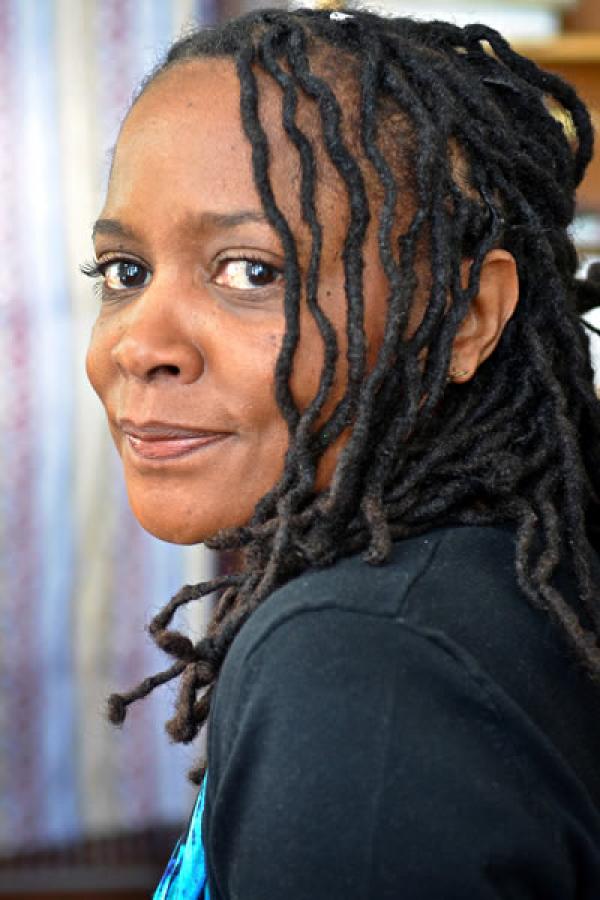Marcia Douglas

Photo by Patrick Campbell/Univ. of Colorado
Bio
Marcia Douglas is the author of the novels Madam Fate and Notes from a Writer’s Book of Cures and Spells as well as the poetry collection Electricity Comes to Cocoa Bottom. Her work has appeared in international journals and anthologies, including Kingston Noir, Caribbean Erotic: Poetry, Prose and Essays, Mojo Conjure Stories, Whispers from Under the Cotton Tree Root, The Art of Friction, The Oxford Book of Caribbean Verse, and The Forward Book of Poetry. Her one-woman show, Natural Herstory, is adapted from her fiction and directed by Cecilia Pang. She is an associate professor at the University of Colorado, Boulder.
Author's Statement
When I think about writing, I recall my Jamaican grandmother, Urselyn, and her foot-peddled sewing machine; her feet peddling one stitch at a time. As a child, something about this act of patience and rhythm and care marked me. I imagined her feet peddling to a far country. Nowadays, I have taken on her sewing as a model for how to create—one word at time. When Urselyn’s husband passed away, she had to raise her children on her own. I imagine her stitching at night by a kerosene lamp; the household asleep, the country yard filled with fireflies. Perhaps in the end, her challenges were not unlike mine. How to create amid the clamor and demands of life? I am thankful that the NEA will allow me to carve out some invaluable time, recreate fireflies and quiet, and spin words that travel to a far country and back. The NEA comes at a time when I am keen to push my writing to a new level; such work is hastened by the provision of time and support. But just as importantly, it is aided by the validation and sense of community that such an award brings. What a gift.
Excerpt from House of Zion
Trench Town Zion Train
Hear this:
If the stones do not cry out, then the dead will—Queen Nanny and Garvey and Sam Sharpe; or someone’s fire-eye grandmoddah; or a flint-face aunt. The bass chord of the people’s wail so trembles the ground, Robert Nesta Marley hears it—and wakes—the sound of pain-o-heart vibrating his bones at 200 Hz. He throws off his coffin shoes and walks all the way to Trench Town on spirit feet. At Three Mile, he hops a ride on the back of a red pick-up. The driver—an old man—recites redemption psalms and drops Bob in front of a Trench Town betting shop. It is the evening of a hurricane warning, and except for a yellow dog, the street is empty; the shops boarded up; concrete blocks securing the zinc roofs. The stillness is yellow, like the dog. A dusty yellow; a yellow that waits. The road joins a gully litter-litter with soda cans, old nails, bottle tops, rusty razors and sardine tins; the breeze makes percussion of the trash, a tinny chanting; soft at first, then growing louder. Someone has scratched red war on a wall. Bob traces the word with his finger, and rain begins to fall. And fall.
Rainwater fills and rinses every pore of him. He takes off his hat and it beats the roots of his hair; rushes down his spine and flushes the crack of his rump. He removes his shoes and it beats between his toes. He cups his hand, and drinks and drinks. And all the while the dog watches from the shop piazza; everything water. Bob lies down in the middle of the road and gives himself to the rain.
When the wind arrives, it hollers and dips; a wheel within a wheel. There is a metal drain at the curb and Bob grips the bars to brace himself. Water rushes; bits of zinc fly—a sheet of window glass—an enamel frying pan—He still holds fast to the drain as the wind lifts him, in the air. See-here: the pages of a book—a woman’s fish knife—a bicycle wheel—the ing—from a shop sign—rain quickening—blood-fiah—the metal grate, a shield.
The wind whirls in the spirit then lands him, give thanks-and-praise, in a yard—dry and quiet; and swept clean as holy ground.

